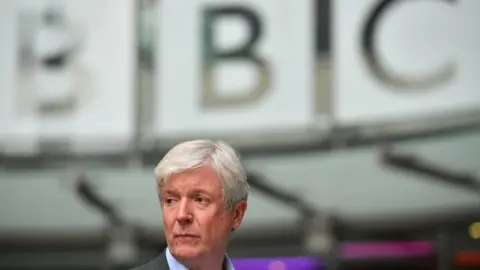What the election fall-out means for the BBC

 Getty Images
Getty ImagesVeterans of the BBC know that battles with the government of the day come with the territory. They are like a background noise which, at regular intervals, becomes a deafening cacophony.
The BBC is always fighting to retain its editorial independence. Though if you were going to design a system for jeopardising that independence, and making it hostage to political whim, the current approach of renewing the Royal Charter every decade or so would be hard to beat.
Among some of those veterans, talk of an existential crisis for the BBC is met with a knowing shrug of the shoulders. We've been here many times before, goes their refrain. The BBC always survives.
But the smarter ones realise that this time is different.
The re-appointment of Nicky Morgan as culture secretary, from her new berth in the House of Lords, and plans to make non-payment of the licence fee a civil rather than criminal offence, which would cost the BBC around £200m, have to be seen in the above light.
There are three reasons why, among those who understand British politics and the structural trends re-shaping global media, anxiety for the future of the BBC has risen sharply of late.
First, personnel. Politics is a mixture of high ideals and low cunning, and both owe their provenance to the characters who happen to be in charge. Right now, the characters in charge of Britain, who have a strong mandate and the wind in their sails, include several known sceptics of the BBC.
In October, Ms Morgan said she was "open-minded" about replacing the licence fee with a different model, including a Netflix-style subscription. There's nothing wrong with that: it's good to be open-minded. But the fact that she wasn't instinctively and trenchantly defending the current model is obviously notable.
During the election campaign, several stories appeared in reputable titles conveying No 10 adviser Dominic Cummings' antipathy toward London media generally, and the BBC in particular. He may be justified in his views, or he may not; what is notable here is that journalists who have a hotline to No 10 have written several stories, for instance, suggesting the government has gone cold on the Today programme.
Also during the campaign, the prime minister said of the BBC: "How long can you justify a system whereby everybody who has a TV has to pay to fund a particular set of TV and radio channels? That is the question. At this stage, we are not planning to get rid of all TV licence fees, although I am certainly looking at it."
It is quite something for a PM to say he "is certainly looking at abolishing the licence fee". He went on: "What I will say is... you have to ask yourself whether that kind of approach to funding a TV, a media organisation, still makes sense in the long term, given the way other organisations manage to fund themselves."
Empty chair
I remember the fury that close advisers to David Cameron felt when the BBC supposedly threatened to "empty chair" him during the 2015 election. In this election, Andrew Neil did empty chair the prime minister. That met with rage among many Conservatives.
Put that rage together with the alliance of Morgan, Cummings and Johnson; add Labour's anger toward the BBC over the campaign; suddenly you find the BBC is more friendless in Westminster than it has been for a long time.
The second reason this time is different is social media. I've written before about the damage some social media platforms are having on our public domain. Twitter in particular had a terrible election, and is debasing much of British journalism in several ways - especially by turning some journalists into addicts and completely warping their view of what people actually care about across the country.
One of the effects of social media, which can be a positive thing, is that it has given a platform to critics of institutions like the BBC who previously had to write a letter or email to get heard.
Tweets or Facebook posts that go viral, including those that espouse conspiracy theories, give a rallying and focal point to anti-BBC feeling online. They create a daily deluge, and senior figures at the corporation are having to spend a huge proportion of their time dealing with this onslaught. You might say: "so they should, they're public servants and we pay their salaries". True; but life for their predecessors, who also faced less competition from rivals and had bigger budgets in real-terms, was easier. By the way - some of those predecessors are the BBC's most prolific critics today.
The intensity of feeling about BBC coverage on social media creates a sense of perpetual crisis, of being under siege, because the BBC hears much more from those who are angry toward it than those it has pleased. This weekend, around 12 million people might have watched Strictly Come Dancing. But in terms of feedback to which bosses are duty-bound to respond, those 12 million people might have created less work than 12 anonymous trolls on Twitter.
Grip weakened
Third, the revolution in global media has irreversibly weakened the BBC's grip on our attention - and with it, the likely future source of licence fee income. Young people just do not consume BBC content like older people do. This trend will accelerate. The BBC can respond to it, but not reverse it.
It is possible to argue that in an era of polarisation, fake news, and new culture wars, the case for a licence fee that serves the whole of the public rather than a subscription service that is tailored to subscribers is strengthened.
But that argument has to be made persuasively and publicly. Conversely, critics of the BBC are right to say that the huge changes in media consumption today challenge the foundation on which the BBC is built.
This is by a long way the biggest of the threats faced by the corporation. The key point is that this genuine, structural challenge allows ideological enemies of the BBC - who might feel it is the broadcasting arm of a metropolitan elite - to wrap their enmity in arguments about digital disruption and navigating the 21st Century.
If you want to chop the BBC down to size, why lambast it as excessively metropolitan (which makes you look partisan) when you can argue - rightly - that younger people are flocking to other services? That makes you look tech savvy and future facing, rather than the bearer of a grudge.
This blog is not addressing at length the BBC's editorial performance during the election campaign. That requires lengthy exposition; and my distinguished colleague Huw Edwards beat me to it.
My argument is more narrow. A combination of personnel changes; the heat and eventual result of this election campaign; the corrosive nature of social media; and the fundamental undermining of the BBC's long-held dominance in both news and entertainment present a new and potentially mortal combination.
The current Royal Charter is up for renewal in 2027, but there is a negotiation to be had over the licence fee in 2022. That licence fee, known to its critics as the telly tax, has been a pillar of Britain's civic architecture for nearly a century.
That pillar could be gone sooner than you think - because this time is different.
